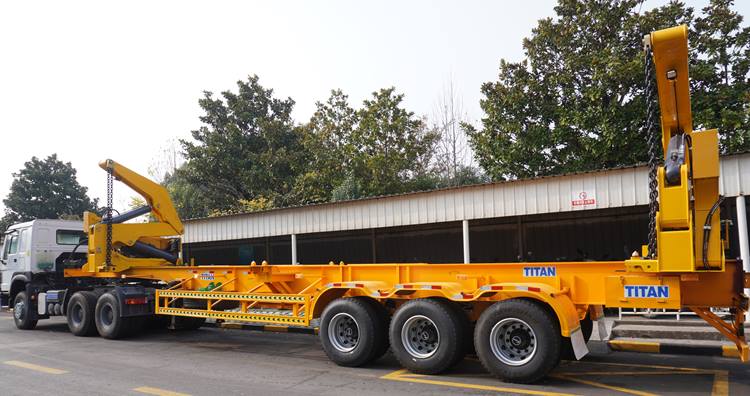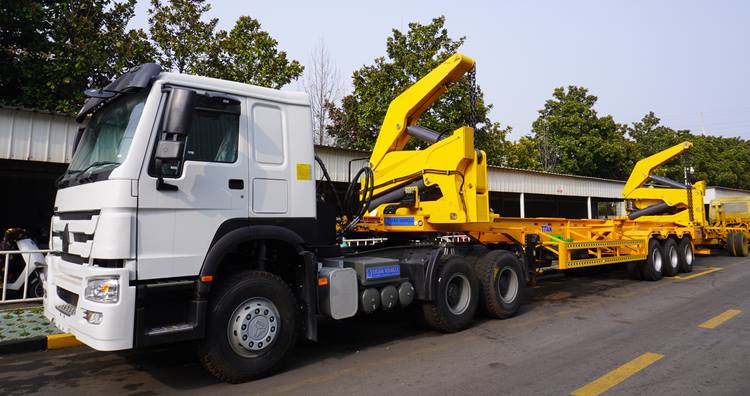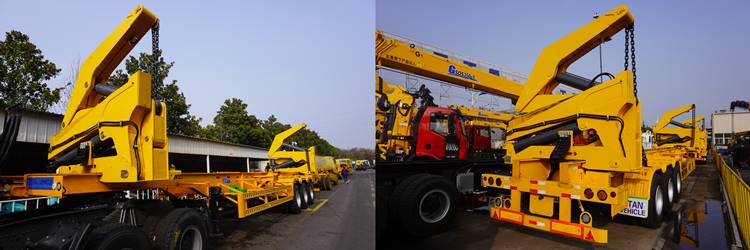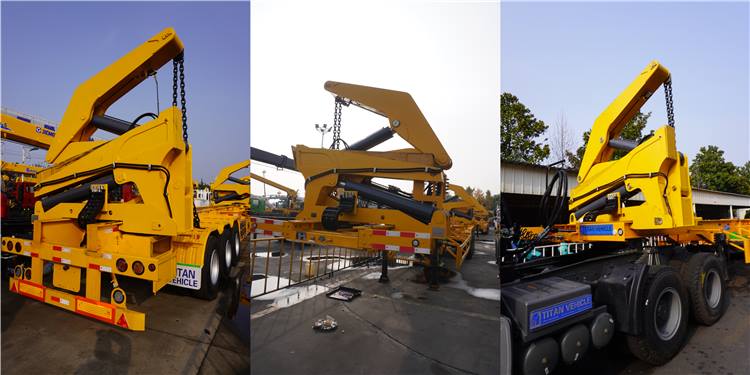Cranes (sometimes called crane modules). The hydraulic crane lifts the container (from the ground, a loading station, another car, a railway wagon, or from the top of another container placed on the ground or other location) and lifts it from the chassis. These cranes are placed on top of the side lift chassis, and they are usually able to travel along the chassis moved by hydraulic cylinders or hydraulic motors to load containers with varying lengths.
Power supply. Generally, cranes are powered by diesel engines or gasoline engines mounted on trailers, and cranes are sometimes powered by the power output shaft of trucks or tractors.
Stabilize the legs. They are equipped with hydraulic feet that eliminate the need to tilt the vehicle when lifting a fully loaded shipping container. They can be adjusted to help operate on uneven ground and promote greater safety margins and load restrictions when stacking containers. In narrow places or when lifting containers from the deck of a railway wagon or trailer, tilting and extending the outriggers can provide more functions.
The chain is connected from the top of the crane to the corner casting at the bottom of the container during the hoisting process. There is a special link device. When placed between two 20-foot containers, the user can lock two 20-foot (2 TEU) containers together, so that the side lifter can lift them, just like 40 The same as a foot container.

The tractor/cab of the towing trailer is powered by PTO in some cases. The tractor/cab always provides compressed air for the wheel brakes of the side lift. Under normal circumstances, if the power forklift is not connected to the tractor, it cannot be operated, because even if the power pack is under the power forklift, the tractor will provide compressed air for the trailer brake and provide extra stability for the lifting operation.
The chassis bears the weight of the container during loading and supports the crane of the container loading trailer.
A remote control is a device with a joystick and buttons, usually connected by multiple pairs of wires or via radio signals, so that the operator can walk around the container and observe the device from all angles during operation.

The designed maximum lifting capacity of the side lift is 45 tons (50 short tons; 44 long tons). Although smaller machines can be used at lighter weights, newer designs can lift 47 tons (52 short tons; 46 long tons) of cargo.
In addition to controlling the lifting of the crane, the operator can sometimes use the stabilizing feet to tilt the chassis, which provides limited ability to operate on limited level ground.
Some side lift cranes have a telescopic chassis, sometimes called a telescopic chassis, which allows the unit to telescope to accommodate containers of 20 feet, 40 feet, or even 45 feet. These trombone units are particularly suitable for small secondary roads, in which case it is difficult to turn using a 40-foot trailer.

Side loaders do not need to turn like standard forklifts, so they can travel upwards next to racks or trucks and easily load and unload from the side
The side loader is designed for narrow aisles and doorways
Long loads such as wood, steel or pipes are easier to handle because the load faces the direction of travel, thereby reducing the overall width and load of the equipment
The flat bed can stabilize the load and ensure safe movement
Since the load is on the side, the operator can clearly see it from front to back
The new side loaders have been developed as multi-directional machines, so they can move in all four directions by changing the wheel direction

Several things to pay attention to for side loader trailer
Side loaders are not as easy to operate as standard forklifts (although multi-directional side loaders have improved in this regard).
The side loader is a special machine. Although they are great for long-term or awkward loads, consider other things you are trying to move, and whether you need to use machines to handle different types of loads, or whether a combination of different equipment works best.
Another option for side loaders is a multi-directional forklift, such as the Combilift series, which has the advantages of side loaders and standard forklifts.
We hope this article is helpful to you and helps you learn more about side loader and how to use side loader when handling long and awkward cargo in narrow aisles and narrow spaces
Through the video below, you can learn about different types of sideloader trailers (like box loader trailer , container lift trailer , side lifter container , container loading trailer , side loader container)
And the process, testing, packaging and customer feedback, etc.
Welcome to click “Blog“, you can get more article about our trailers.